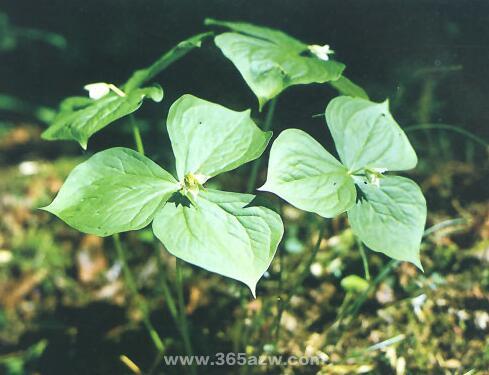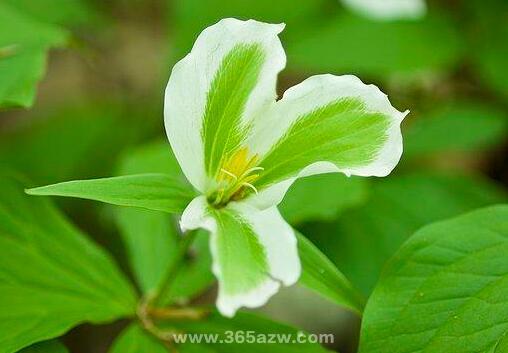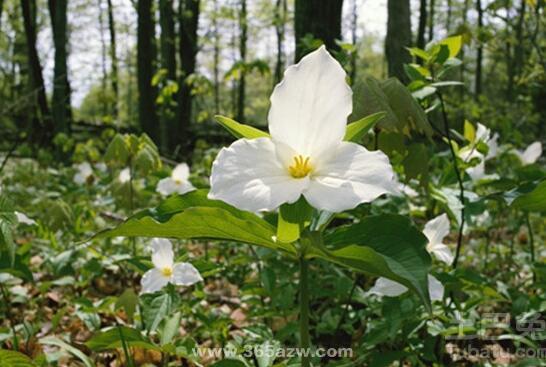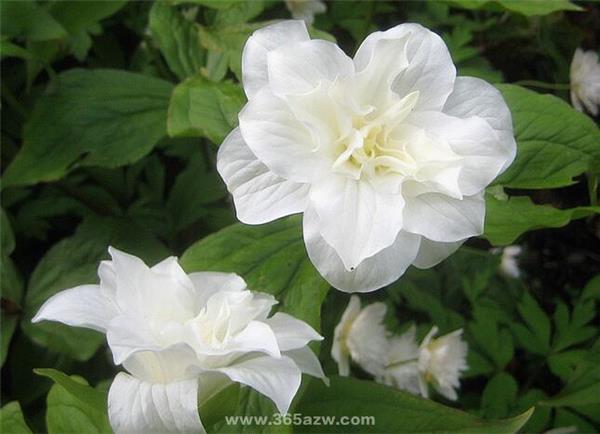Matters needing attention in the cultivation of Trillium chinense
Trillium is a kind of herbaceous plant. What problems should be paid attention to in breeding Trillium? Next, let's take a look at it.
An introduction to Trillium chinense

Trillium (TrilliumtschonoskiiMaxim.), a plant of Liliaceae. Trillium is a perennial herb with clumps of stems on thick and short rhizomes, 15-50 cm high.
Yancheng grass grows in forests, shady valleys, slopes or roadside rocks at an altitude of 1600-3200 meters. It has the effects of promoting blood circulation, relieving pain, stopping bleeding, detumescence and removing rheumatism.
Morphological characteristics of Trillium chinense
Stem
Trillium is a perennial herb with clumps of stems on thick and short rhizomes, 15-50 cm high.
Leaf
The leaves of Trillium are rhomboid or rhomboid, 6-15 cm long and 5-15 m wide, subsessile.
Flowers
Pedicel 1-4 mm long; outer tepals ovate-lanceolate, green, 1.5-2 cm long and 5-9 mm wide, inner tepals white, rarely lavender, ovate-lanceolate, 1.5-2.2 cm long and 4-6 (- 10) mm wide; style 4-5 mm long; anthers 3-4 mm long, shorter than or nearly equal to filaments, with slightly prominent connective apices Ovary conical-ovate, 7-9 mm long and 5-7 mm wide.
Fruit

The berries of Trillium are globose, 1.5-1.8 cm in diameter, black-purple, with many seeds.
The flowering period is from April to June and the fruiting period is from July to August.
Pest control
Yancheng grass has strong resistance to adversity, and there are few diseases and insect pests in the early stage of artificial planting. Generally, it only needs to carry out bed soil disinfection, and during the later period, overwintering bud mildew and rhizome rot may occur. During and before the onset of the disease, pentachloronitrobenzene can be used for foliar and soil surface spray control, and the total effective rate is 95%.
Breeding technology
sexual propagation. Sexual reproduction is to propagate the seeds of Trillium. The picked berries are scrubbed with water, peeled and peeled, and dried to get pure seeds. Then the seeds are mixed with river sand according to the ratio of 1 ∶ 5, and stored indoors to be sown. In the first and middle of November, the seeds treated by indoor stratification were taken out, screened and sown. The methods include sowing and strip sowing, compared with strip sowing, it can save seeds, emergence neatly and facilitate seedling management. Before sowing, evenly spread a layer of (10cm) matured and fine stable manure on the border surface, row sowing, row spacing 10cm, each row with 200 million 250 seeds, and then evenly spread a layer of 2cm thick plant ash on the seeds.
The seeds of Trillium have the characteristic of dormancy, and they have to go through two vernalization stages to germinate in the soil, and they are generally not used in the field because of their low reproduction coefficient. However, after years of seed breeding research, there has been a certain breakthrough, after a certain treatment, the seeds have been able to germinate for about half a year.

Asexual reproduction. After cutting the root and stem of Trillium chinense, the bud eyes on it can sprout seedlings that can live independently for asexual reproduction, and the reproduction coefficient is more than 10, which is valuable for production and utilization. In late August, when the seedlings of Trillium vulgaris were fallen, the underground rhizome was dug and cut 4-8 pieces longitudinally according to the size of the rhizome in the direction parallel to the main axis of the rhizome. The cutter should be thin and sharp, so as to avoid cracks at the cut and reduce infection. Soak 1min with 0.5% metalaxyl immediately after cutting the rhizome. The sowing land is deeply turned to dry soil in dog days, broken soil is used as a border, the border is high 15~20cm, and the border surface is tiled back shape. 2% metalaxyl spray was used to disinfect the soil before sowing. Border soil ditching depth 3~4cm, application of rotten cow dung 45000kg/ ha, cover soil 1cm, cut pieces according to the specification 15cm × 10cm sowing, cover soil 3cm, use branches to build shade shed, light transmittance 70%.

The above is the introduction of Yancheng grass culture. I hope it will be helpful to you.
Related
- Wuhan Hospital Iron Tree Blooming Result Was Instantly Frightened by the Gardener Master
- Which variety of camellia is the most fragrant and best? Which one do you like best?
- What is the small blue coat, the breeding methods and matters needing attention of the succulent plant
- Dormancy time and maintenance management of succulent plants during dormancy
- Minas succulent how to raise, Minas succulent plant pictures
- What are the varieties of winter succulent plants
- How to raise succulent plants in twelve rolls? let's take a look at some experience of breeding twelve rolls.
- Attention should be paid to water control for succulent plants during dormant period (winter and summer)
- Watering experience of twelve rolls of succulent plants
- Techniques for fertilizing succulent plants. An article will let you know how to fertilize succulent plants.



